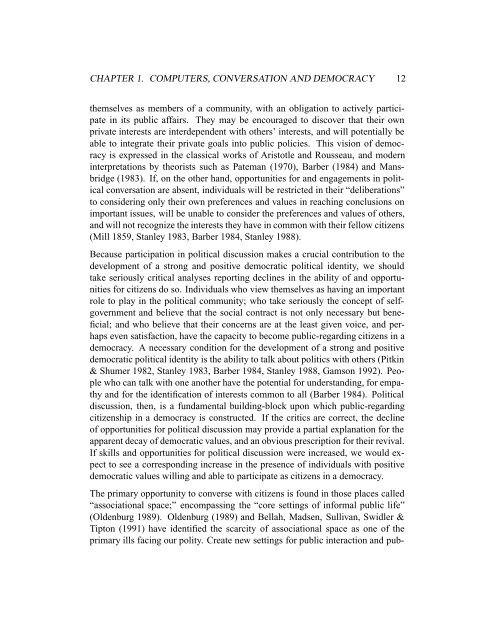Expanding the Public Sphere through Computer ... - ResearchGate
Expanding the Public Sphere through Computer ... - ResearchGate
Expanding the Public Sphere through Computer ... - ResearchGate
Create successful ePaper yourself
Turn your PDF publications into a flip-book with our unique Google optimized e-Paper software.
CHAPTER 1. COMPUTERS, CONVERSATION AND DEMOCRACY 12<br />
<strong>the</strong>mselves as members of a community, with an obligation to actively participate<br />
in its public affairs. They may be encouraged to discover that <strong>the</strong>ir own<br />
private interests are interdependent with o<strong>the</strong>rs’ interests, and will potentially be<br />
able to integrate <strong>the</strong>ir private goals into public policies. This vision of democracy<br />
is expressed in <strong>the</strong> classical works of Aristotle and Rousseau, and modern<br />
interpretations by <strong>the</strong>orists such as Pateman (1970), Barber (1984) and Mansbridge<br />
(1983). If, on <strong>the</strong> o<strong>the</strong>r hand, opportunities for and engagements in political<br />
conversation are absent, individuals will be restricted in <strong>the</strong>ir “deliberations”<br />
to considering only <strong>the</strong>ir own preferences and values in reaching conclusions on<br />
important issues, will be unable to consider <strong>the</strong> preferences and values of o<strong>the</strong>rs,<br />
and will not recognize <strong>the</strong> interests <strong>the</strong>y have in common with <strong>the</strong>ir fellow citizens<br />
(Mill 1859, Stanley 1983, Barber 1984, Stanley 1988).<br />
Because participation in political discussion makes a crucial contribution to <strong>the</strong><br />
development of a strong and positive democratic political identity, we should<br />
take seriously critical analyses reporting declines in <strong>the</strong> ability of and opportunities<br />
for citizens do so. Individuals who view <strong>the</strong>mselves as having an important<br />
role to play in <strong>the</strong> political community; who take seriously <strong>the</strong> concept of selfgovernment<br />
and believe that <strong>the</strong> social contract is not only necessary but beneficial;<br />
and who believe that <strong>the</strong>ir concerns are at <strong>the</strong> least given voice, and perhaps<br />
even satisfaction, have <strong>the</strong> capacity to become public-regarding citizens in a<br />
democracy. A necessary condition for <strong>the</strong> development of a strong and positive<br />
democratic political identity is <strong>the</strong> ability to talk about politics with o<strong>the</strong>rs (Pitkin<br />
& Shumer 1982, Stanley 1983, Barber 1984, Stanley 1988, Gamson 1992). People<br />
who can talk with one ano<strong>the</strong>r have <strong>the</strong> potential for understanding, for empathy<br />
and for <strong>the</strong> identification of interests common to all (Barber 1984). Political<br />
discussion, <strong>the</strong>n, is a fundamental building-block upon which public-regarding<br />
citizenship in a democracy is constructed. If <strong>the</strong> critics are correct, <strong>the</strong> decline<br />
of opportunities for political discussion may provide a partial explanation for <strong>the</strong><br />
apparent decay of democratic values, and an obvious prescription for <strong>the</strong>ir revival.<br />
If skills and opportunities for political discussion were increased, we would expect<br />
to see a corresponding increase in <strong>the</strong> presence of individuals with positive<br />
democratic values willing and able to participate as citizens in a democracy.<br />
The primary opportunity to converse with citizens is found in those places called<br />
“associational space;” encompassing <strong>the</strong> “core settings of informal public life”<br />
(Oldenburg 1989). Oldenburg (1989) and Bellah, Madsen, Sullivan, Swidler &<br />
Tipton (1991) have identified <strong>the</strong> scarcity of associational space as one of <strong>the</strong><br />
primary ills facing our polity. Create new settings for public interaction and pub-
















